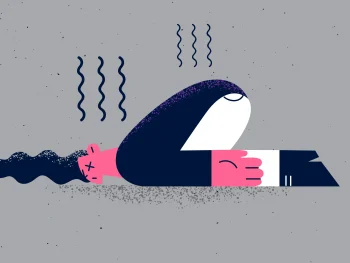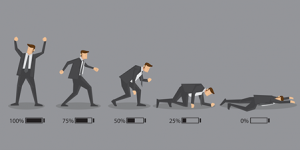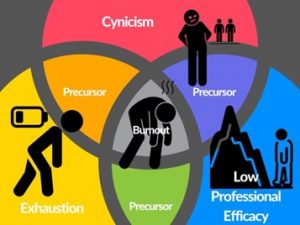
THE GREAT EXHAUSTION


![]() Why are we all experiencing an absolute, overwhelming feeling of emotional exhaustion?
Why are we all experiencing an absolute, overwhelming feeling of emotional exhaustion?
It’s being called The Great Exhaustion – but what has led to this phenomenon and what can we do about it?
The Great Resignation was how the end of 2021 was described, as thousands of people across the UK and around the world left their jobs amid the coronavirus pandemic.
 In fact, research revealed that 30% of women surveyed said they had changed jobs since the start of the pandemic, and a study by software provider CIPHR also found that one in three people retrained for a new career or changed the industry they worked in between 2020 and 2021.
In fact, research revealed that 30% of women surveyed said they had changed jobs since the start of the pandemic, and a study by software provider CIPHR also found that one in three people retrained for a new career or changed the industry they worked in between 2020 and 2021.
This year, there seems to be a different collective experience, one defined by what has taken place over the past few years and the many changes we’re going through on both a personal and global level. It’s something experts are describing as The Great Exhaustion.
The Great Exhaustion is defined by large numbers of the workforce experiencing an overwhelming feeling of emotional exhaustion, and it’s something that’s disproportionately affecting women.
“The Great Exhaustion is a much bigger issue for women than The Great Resignation that we keep hearing about in the business press,” says Professor Rae Cooper, whose research at the University of Sydney looks at gender, work and employment relations, explaining that it’s about “the weariness of people after 30 months of thoroughly stressful life”.
The Great Exhaustion is defined by large numbers of the workforce experiencing an absolute, overwhelming feeling of emotional exhaustion and it is disproportionately affecting women.

This isn’t just about work life, though. Professor Cooper says that The Great Exhaustion refers to our collective overwhelm and trauma after experiencing the mental, physical and financial effects of the pandemic. We have had long periods when people’s health and livelihoods have been challenged, and when schools and nurseries were closed this added an extra layer of complexity and stress for parents, particularly mothers, as they tried to keep everything and everyone going, she says.

Even though people have taken action to try and improve their work lives, hence The Great Resignation, the act of moving jobs doesn’t necessarily fix things, and making so many big choices, such as a career switch, could lead to decision fatigue, which is part of our collective exhaustion.
There’s something very tiring about trying to carry on as normal while the world turns upside down around you, says career change coach Alice Stapleton. Nothing feels certain at the moment, yet we’re expected to show up each day at work like none of that is happening. It’s exhausting.
On top of this, many people are still feeling the effects of the pandemic when it comes to the amount of responsibility they’re being asked to take on at work: Workloads are increasing because companies are reducing resources to claw back money lost over the past few years. Or they are struggling to fill vacancies for several reasons.

A 2022 report from the tech company Poly based on a comprehensive study of 2,528 global business decision makers found 49% of organisations say there is an unhealthy culture of overworking in their business that they must put a stop to, but around half of the businesses surveyed hadn’t taken any steps to deal with burnout yet. And while some people have been able to quit jobs with toxic working environments, others are stuck in roles they find unfulfilling and exhausting.
It requires an enormous effort to show up each day for a job you don’t feel passionate about, especially if it’s a stressful one. The constant lack of satisfaction, motivation and authenticity can lead to real exhaustion.

Many employers are trying to deal with symptoms of The Great Exhaustion and collective burnout, like by switching to four-day weeks, offering mental health support and introducing mental health days. But these measures are often tokenistic rather than things that lead to real change for their employees.
So, what meaningful steps can employers actually take to deal with The Great Exhaustion? O’Brien stresses that it mostly comes down to education. Training managers in understanding stress and mental health is vital in ensuring that they know their role in minimising the risk of burnout in their team. Companies must ensure that they truly embed a culture of work/life balance, and managers must lead by example.
Part of the reason people are feeling so drained right now is because they are being given the option to work less with greater flexibility and annual leave allowances, but ultimately, they’re being looked down on if they do work less as a result – it’s a choice paradox that can create more stress than it solves if the working environment is toxic.

Ultimately, The Great Exhaustion is also a societal issue, rather than just a workplace one. And changing the way we think and feel about work and life isn’t an issue anyone is going to solve overnight, especially for women, whose societal role in the workplace has changed monumentally in the last 100 years and even more recently than that.
Women are constantly bombarded by two main messages:
![]() 1. Encouraged to stay at home, look after children, maintain a clean and tidy home
1. Encouraged to stay at home, look after children, maintain a clean and tidy home
![]() 2. Encouraged to strive to be the best at work and to even out the numbers at board level.
2. Encouraged to strive to be the best at work and to even out the numbers at board level.
Millennials in particular are sandwiched between a generation who mainly listened to the first message and a younger generation who buy more into the second.
Navigating our views around work is complicated, and frankly, it’s exhausting. So, it’s no wonder we’re all feeling burnt out. Thankfully, the pandemic did mark a change in workplace culture, one in which employers started to listen to the needs of their workers. We can only hope that these changes will have a positive impact on our collective mindsets, attitudes, and lifestyles.


Content per Stylist.co.uk




